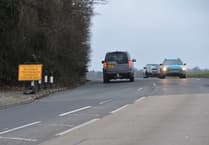A NEWTON Abbot smallholder whose pigs were found caked in muck and wading through slurry six inches deep has been told he may go to prison.
Victor Wilmington, of Protector Cottage, Ingsdon, was found guilty of 15 animal welfare charges on Friday after a two-day trial at South Devon Magistrates at Newton Abbot.
Twelve charges concern unnecessary suffering caused to a sow and 11 young pigs. Acting on a complaint, an animal welfare officer found them in a flooded stable, belly-deep in watery mud and slurry.
The court heard that the sow was emaciated with prominent backbone, pelvic bones and ribs. There was nowhere dry to lie down or access to fresh water.
Three charges relate to conditions inside the stable and one to the condition of a boar's paddock which was littered with potentially harmful debris. Three lesser charges were dropped.
Barrister Tom Bradnock, prosecuting for Devon County Council trading standards, argued that 22 similar convictions in February 2008, should also be used in evidence. At that time he was fined £5,015.
Wilmington, representing himself, argued against this saying his guilty plea in February had been made on financial grounds because his business had gone into administration and he had been declared bankrupt. Magistrates ruled the previous convictions could be used as part of the prosecution case.
In his opening address, Mr Bradnock said that animal welfare officer Rebecca Langdon visited the 22-acre smallholding on September 11, 2008. Neither Mr Wilmington nor his wife were at home.
She found a black and white boar in a small paddock littered wood fencing, broken pallets with protruding nails and polythene sheeting all of which were potentially hazardous.
Mrs Langdon alerted Anna Harrison, a Defra vet. She inspected a stable which was six inches deep in watery slurry. Inside were 12 pigs, a sow and 11 piglets, all of which were covered in mud and slurry.
'They had nowhere dry where they could lie down and have access to fresh water. A hole with jagged edges had been gnawed between the stables.'
She said there was a pungent smell, making it difficult to breathe. An automatic drinker on the floor was also filled with muddy liquid.
When Mrs Harrison arrived she examined the sow using a body condition scoring system where nought is totally emaciated and five is obese. Healthy score would be at least two-and-a-half. She scored the sow at one.
They called the RSPCA and inspector Jim Farr arrived. The three of them spent 20 minutes erecting a temporary platform using materials in the yard.
Mrs Wilmington, who had by now arrived home, went out to buy bedding and food. Later that day the pigs were removed to another farm.
'Mr Wilmington was the sole owner and keeper of the pigs and was therefore responsible for their welfare,' Mr Bradnock said.
Photographic and video evidence was shown of conditions on the smallholding.
Mrs Langdon, an animal welfare officer for five years, said she could not identify the breed of the pigs, they were caked so thickly in muck.
Mrs Harrison, a vet of 23 years' experience, said that while the boar was in good condition, the sow was not.
'It should have been obvious to any reasonable stockman that she was in an unacceptably thin and poor condition.
'She had young pigs that were probably trying to feed off her, it would just compound the situation. In my opinion she was suffering unnecessarily,' she said.
The piglets were filthy and had nowhere to lie. One was shivering, another had lost its tail.
'In my opinion all the animals in the stable were suffering because they didn't have their basic needs met of a clean and comfortable place to rest and access to drinking water.'
RSPCA inspector Jim Farr, the next to arrive, described how they lashed up a dry platform in the stable, using sheets of plywood and bricks.
'It didn't take any encouragement for the pigs to move up to it. They wolfed down the food in a matter of minutes. They were hungry.'
Giving evidence, Wilmington said he had been farming for five years. As a result of the 2008 court case, he decided to scale back the number of pigs, just keeping the boar and the sow because of an 'emotional attachment'. Unfortunately the sow was in pig.
He claimed he fed and cleaned the pigs out daily.
Four days before the animal welfare officer visit, he found water in the stables and noticed the regulator on the automatic drinker was missing. He said he replaced it and checked it was working properly.
The day before the visit, the regulator on the drinker had again gone missing and suggested it had been interfered with. He decided it was better to let the water run, rather than leave the pigs with nothing to drink. It was this, he claimed which caused the flooding.
He said the debris in the boar's paddock were 'playthings' and helped keep the animal calm. He denied that the jagged hole in the stable partition wall was dangerous as none of the pigs had injured themselves.
He said he did not accept that the sow was emaciated, saying it was a naturally lean breed.
'She was receiving additional food and I think her condition was as a result of her still feeding her young,' he said.
He said he had now stopped keeping pigs and voluntarily given up his licence.
Mr Bradnock said: 'What all the photographs and video show is a complete lack of care and neglect in every area.'
'No,' said Wilmington.
Magistrates adjourned the case for probation reports. These will consider all options from a community penalty to a maximum 15 weeks in prison.
Wilmington will be sentenced on August 21 at Torquay courthouse.
A county spokesman said: 'I hope this case sends a clear message that poor welfare standards are not acceptable in Devon and that the county council will do all it can to promote best practises in farmed animal health and welfare.'





Comments
This article has no comments yet. Be the first to leave a comment.